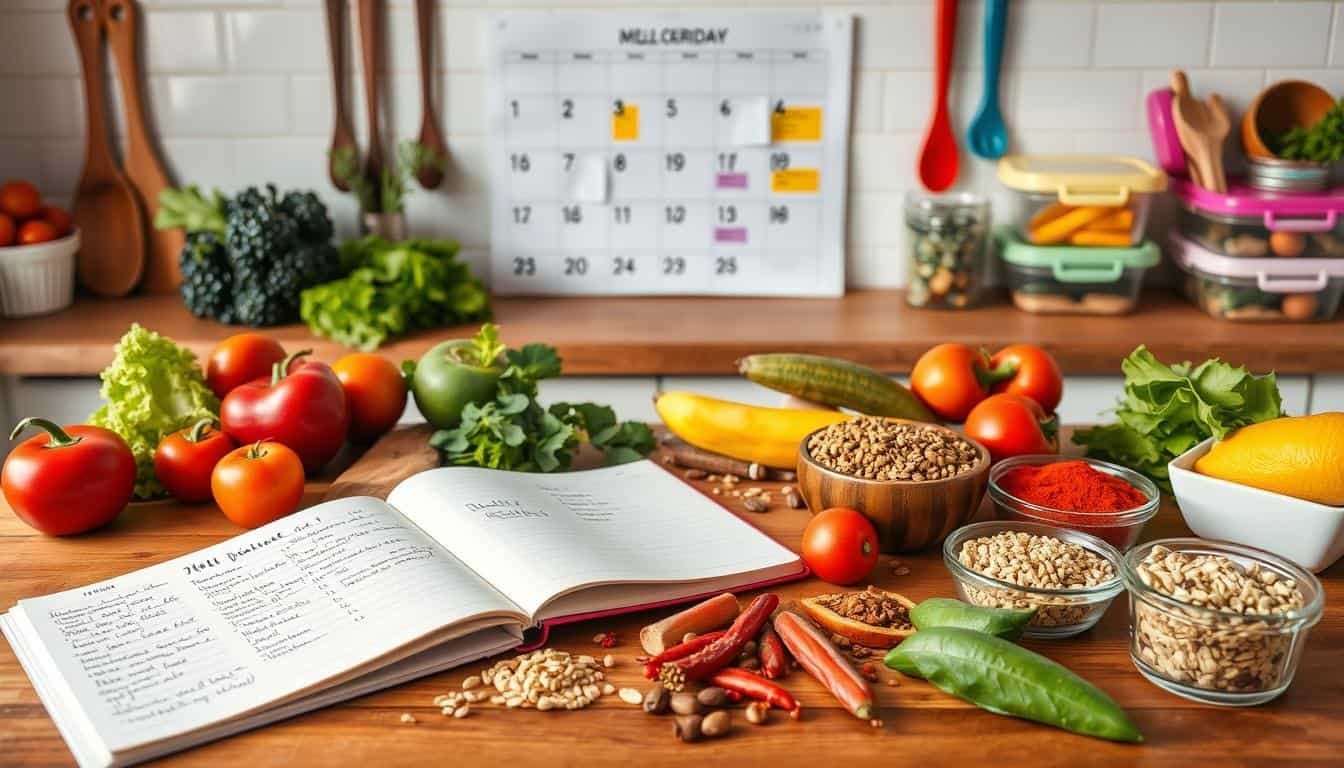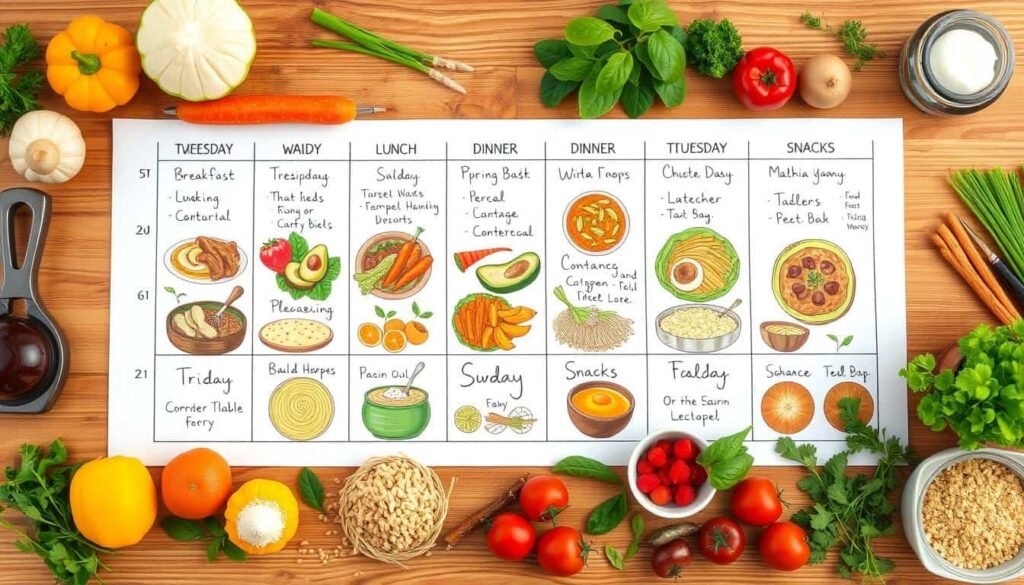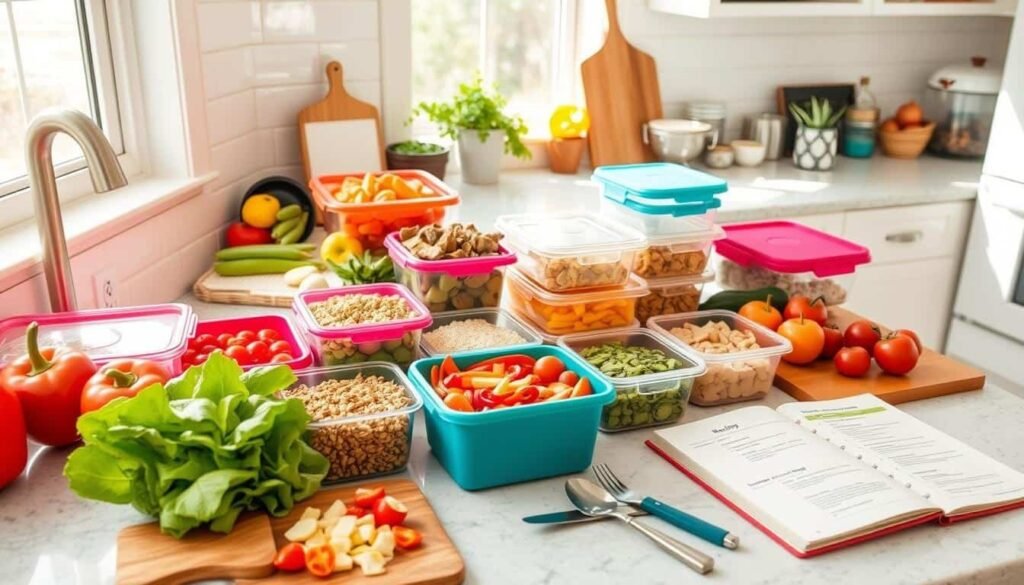How to Create a Weekly Meal Plan for Success
This post may contain affiliate links. If you click and buy, we may earn a small commission at no extra cost to you. Learn more.
Meal planning can be a game-changer when it comes to achieving your nutrition and health goals. By taking the time to create a comprehensive weekly meal plan, you can save time, reduce stress, and ensure that you’re consistently fueling your body with nourishing, well-balanced meals. In this guide, we’ll walk you through the step-by-step process of crafting a weekly meal plan that sets you up for success.
Meal planning involves taking a proactive approach to organizing your meals and snacks for the week ahead. This strategic approach not only helps you stay on track with your dietary needs but also allows you to make the most of your time in the kitchen. By planning your meals in advance, you can minimize last-minute decision-making, reduce food waste, and ensure that you’re consistently eating nutritious, satisfying meals.
Contents
- 1 Understanding the Importance of Meal Planning
- 2 Assessing Your Dietary Needs
- 3 Setting Up Your Meal Planning System
- 4 How to Create Your Weekly Menu
- 5 Shopping Smart for Your Meal Plan
- 6 Preparing Your Meals Ahead of Time
- 7 Storing and Freezing Meals
- 8 Making Adjustments to Your Meal Plan
- 9 Staying Motivated with Meal Planning
- 10 Exploring New Recipes
- 11 Reviewing Your Meal Planning Process
- 12 FAQ
- 12.1 What are the benefits of meal planning?
- 12.2 How do I assess my dietary needs for meal planning?
- 12.3 What tools and methods can I use for effective meal planning?
- 12.4 How do I balance macronutrients in my weekly menu?
- 12.5 How can I save money on my grocery trips?
- 12.6 What are some effective meal prep techniques?
- 12.7 How do I store and freeze meals for later use?
- 12.8 How can I stay motivated with my meal planning routine?
Key Takeaways
- Meal planning can save you time, money, and reduce stress in the kitchen.
- A well-designed weekly meal plan helps you stay on track with your nutrition goals.
- Meal planning allows you to make the most of your time and reduce food waste.
- Crafting a weekly meal plan involves considering your dietary needs, preferences, and available resources.
- Meal planning can be a game-changer in achieving a healthy, balanced diet.
Understanding the Importance of Meal Planning
Meal planning is a powerful tool that can transform your approach to healthy eating and food budgeting. By taking the time to plan your meals in advance, you can unlock a world of benefits that can positively impact your lifestyle.
Benefits of Meal Planning
One of the primary advantages of meal planning is the ability to save money. By creating a detailed grocery list and sticking to it, you can avoid impulse purchases and reduce food waste. This, in turn, helps you stay within your food budgeting goals and allocate your resources more effectively.
Reducing Food Waste
Meal planning also plays a crucial role in reducing food waste. When you have a clear idea of what you’ll be eating each week, you’re less likely to let fresh produce or perishable items go to waste. This not only saves you money but also contributes to a more sustainable and environmentally-friendly lifestyle.
Time Management in the Kitchen
Effective meal planning can also streamline your time in the kitchen. By preparing meals in advance or incorporating batch-cooking techniques, you can save valuable time during the week and focus on other important tasks. This improved time management allows you to maintain a healthy meal planning routine while balancing the demands of your daily life.
Embracing the benefits of meal planning can be a game-changer in your journey towards healthier eating habits and better food budgeting. By taking the time to plan your meals, you can unlock a world of cost savings, reduced food waste, and enhanced time management in the kitchen.
Assessing Your Dietary Needs
When it comes to nutrition planning and diet planning for a healthier lifestyle, the first step is to assess your individual dietary needs. This involves evaluating your nutritional goals, considering any food allergies or intolerances, and understanding how these factors can shape your healthy eating habits.
Evaluating Nutritional Goals
Begin by reflecting on your personal health and wellness objectives. Are you aiming to maintain a balanced diet, lose weight, or address a specific medical condition? Your nutrition planning should be tailored to support these goals. Consider factors such as your age, activity level, and any pre-existing health concerns to determine the optimal macronutrient and micronutrient balance for your body.
Considering Food Allergies and Intolerances
It’s also essential to identify any food allergies or intolerances you may have. These can significantly impact your diet planning and require you to make adjustments to your meal choices. Being mindful of ingredients that trigger adverse reactions will help you create a healthy eating plan that nourishes your body without causing discomfort or harm.
“Proper nutrition planning is the foundation for a healthy and balanced lifestyle.”
By assessing your dietary needs, you can develop a meal planning strategy that meets your unique requirements and supports your overall well-being. This personalized approach to diet planning will set you up for long-term success in achieving your health and fitness goals.
Setting Up Your Meal Planning System
Meal planning is the foundation for achieving your culinary goals, whether it’s saving time, reducing food waste, or enjoying healthier home-cooked meals. To set up an effective meal planning system, you’ll need to explore the various tools and methods available, as well as organize your recipe collection for easy access.
Choosing Tools for Meal Planning
The first step in setting up your meal planning system is to select the right tools for the job. From digital meal planning apps to traditional pen-and-paper approaches, there are numerous options to consider. Digital tools often offer features like recipe management, grocery list generation, and even meal scheduling. Meanwhile, a simple notebook or whiteboard can provide a more hands-on, customizable experience.
- Explore meal planning apps like Paprika, AnyList, or Plan to Eat
- Utilize spreadsheets or online templates to create your own weekly menus
- Opt for a magnetic whiteboard or a chalkboard to visually plan your meals
Organizing Your Recipe Collection
The key to efficient recipe management is to have a well-organized system for storing and accessing your favorite dishes. Whether you prefer digital or physical recipe storage, find a method that works best for your needs and lifestyle.
- Digitize your recipes using apps, online tools, or document scanners
- Categorize your recipes by type, cuisine, or dietary requirements
- Create a dedicated recipe binder or file system for physical copies
- Use tags, folders, or a recipe database to quickly find what you need
By setting up a comprehensive meal planning system and organizing your recipe collection, you’ll be well on your way to creating delicious and efficient weekly menus that will save you time and money in the kitchen.
How to Create Your Weekly Menu
Creating a well-balanced weekly menu is a crucial step in your nutrition planning journey. By thoughtfully constructing your weekly menus, you can ensure that your family enjoys a variety of healthy and delicious meals while maximizing efficiency in the kitchen. Let’s explore the key elements to consider when crafting your weekly menus.
Balancing Macronutrients
A balanced diet should include a harmonious blend of macronutrients: proteins, carbohydrates, and healthy fats. When planning your weekly menus, aim to incorporate a variety of nutrient-dense foods that provide the right proportions of these essential macronutrients. This will not only support overall health but also keep your family feeling satisfied and energized throughout the week.
Incorporating Seasonal Ingredients
Embracing seasonal produce is a fantastic way to enhance the flavor and nutritional value of your weekly meals. Take advantage of the bounty of fresh, locally-sourced ingredients that are in season. Not only does this add vibrant colors and unique flavors to your dishes, but it also supports sustainable and environmentally-friendly eating habits.
Family Preferences and Involvement
- Engage your family members in the weekly menu planning process. Gather their input on their favorite meals and any dietary restrictions or preferences.
- Incorporate their feedback to create a menu that caters to the diverse tastes and needs of your household.
- Involving your family promotes a sense of ownership and encourages everyone to participate in healthy eating habits.
By striking a balance between nutritional considerations, seasonal ingredients, and family preferences, you can craft a weekly menu that sets your household up for culinary success and supports your overall health and wellness goals.
“Meal planning is the foundation for a healthy, balanced diet. It empowers you to make smart choices and ensures your family enjoys delicious, nourishing meals all week long.”
Shopping Smart for Your Meal Plan
Crafting a comprehensive grocery list and adopting money-saving strategies can make a significant difference in your overall food budgeting and meal planning efforts. By approaching grocery shopping with intention and efficiency, you can ensure your weekly meal plan stays on track while keeping your expenses in check.
Crafting a Grocery List
The key to a successful grocery trip starts with a well-thought-out grocery list. Begin by reviewing your meal plan for the week and identifying all the necessary ingredients. Group similar items together, such as produce, dairy, and pantry staples, to streamline your shopping experience. Remember to account for any additional snacks, condiments, or household items you may need.
Shopping Tips to Save Money
- Stick to your grocery list to avoid impulse purchases and overspending.
- Take advantage of sales, coupons, and loyalty program discounts to maximize your savings.
- Buy in bulk for non-perishable items that you use frequently, such as grains, spices, and canned goods.
- Opt for store-brand alternatives, which are often more affordable than name-brand products.
- Shop the perimeter of the store, where fresh, whole foods are typically located, to save on processed and packaged items.
By incorporating these grocery list and food budgeting strategies into your meal planning routine, you can streamline your grocery trips and make the most of your food budget.
Preparing Your Meals Ahead of Time
Meal prepping is a game-changer when it comes to streamlining your weekly routine. By investing a little time upfront, you can reap the benefits of having nutritious, home-cooked meals readily available throughout the week. This section explores the essential elements of batch cooking and quick meal prep techniques to help you master the art of meal planning.
Batch Cooking Essentials
Batch cooking is a powerful strategy that allows you to prepare multiple servings of a dish at once. This approach not only saves time but also helps reduce food waste. Consider these key batch cooking tips:
- Choose recipes that are easily scalable, such as soups, stews, and casseroles.
- Allocate a dedicated meal prep day or time block to tackle your weekly cooking tasks.
- Embrace the use of the oven, slow cooker, or Instant Pot to efficiently cook larger portions.
- Invest in airtight containers to store your batch-cooked meals for easy reheating throughout the week.
Quick Meal Prep Techniques
For those busier days when you don’t have time for extensive meal preparation, quick meal prep techniques can be a lifesaver. Explore these time-saving strategies:
- Wash, chop, and store fresh produce in advance, making it easy to assemble salads or stir-fries.
- Cook a large batch of whole grains, such as quinoa or brown rice, and use them as a base for various meals.
- Prepare protein-rich components, like baked chicken breasts or roasted vegetables, to quickly build balanced plates.
- Stock up on healthy, shelf-stable snacks and ingredients to create simple, nutrient-dense dishes on the fly.
By mastering both batch cooking and quick meal prep techniques, you’ll be well on your way to consistently enjoying delicious, nutritious meals while saving valuable time in the kitchen.
Storing and Freezing Meals
Meal preparation is a game-changer when it comes to maintaining a healthy lifestyle and saving time in the kitchen. But once you’ve cooked your meals, the next step is ensuring they’re properly stored and frozen to preserve freshness and maximize their shelf life. In this section, we’ll explore the best practices for food storage and identify which meals are ideal for freezing.
Best Practices for Food Storage
Proper food storage is crucial for maintaining the quality and safety of your meals. Here are some tips to keep in mind:
- Store cooked meals in airtight containers or resealable plastic bags to prevent air exposure and preserve freshness.
- Label each container with the contents and date to help you keep track of what’s in your pantry or fridge.
- Invest in a good set of food storage containers that are BPA-free and stackable for efficient organization.
- Rotate your pantry items and refrigerated foods to ensure you’re consuming them before they spoil.
- Maintain a clean and organized pantry organization system to easily access your ingredients and meal prep supplies.
Understanding Freezer-Friendly Meals
Freezing is a great way to extend the shelf life of your meals and minimize food budgeting. But not all dishes are created equal when it comes to freezing. Here are some guidelines on which meals work best:
- Soups, stews, and casseroles: These hearty dishes tend to freeze well and can be reheated easily.
- Proteins: Lean meats, poultry, and fish can be frozen individually or in pre-portioned servings for convenient meal prep.
- Grains and legumes: Cooked rice, quinoa, and beans can be frozen and added to meals later.
- Baked goods: Breads, muffins, and cookies can be frozen to enjoy at a later time.
By following these best practices and understanding which meals are freezer-friendly, you can streamline your meal prep process and ensure your hard work in the kitchen doesn’t go to waste.
Making Adjustments to Your Meal Plan
Meal planning is a powerful tool for managing your time and maintaining a healthy lifestyle, but it’s essential to recognize that life is unpredictable. As schedules and dietary needs change, you’ll need to be flexible and adaptable to ensure your meal plan continues to serve you well.
Flexibility with Meal Preps
One of the keys to successful meal planning is being able to adjust your weekly menus as needed. Perhaps a work deadline forces you to prioritize quick, easy meals one week, or a family event requires you to prepare a larger gathering. By building in flexibility, you can keep your meal planning on track while accommodating life’s curveballs.
- Identify go-to meals that can be easily adjusted or repurposed
- Batch cook versatile ingredients that can be incorporated into multiple dishes
- Keep a stash of frozen, weekly menus-friendly meals for when time is tight
Adapting to Changing Schedules
As your time management needs evolve, your meal plan must evolve with them. Whether it’s a new job, a busier social calendar, or unexpected family commitments, being able to pivot your meal prep and dining habits is crucial.
- Reevaluate your weekly schedule regularly to identify potential conflicts
- Prioritize quick, nourishing meals on hectic days
- Embrace the occasional takeout or dining out option when time is limited
Remember, the goal of meal planning is to simplify your life, not add unnecessary stress. By maintaining a flexible approach, you can ensure your meal planning remains a valuable tool in your daily routine, no matter what comes your way.
Staying Motivated with Meal Planning
Maintaining motivation is crucial when it comes to successful meal planning and healthy eating. By setting realistic goals and celebrating your successes, you can stay focused and energized on your journey towards better diet planning.
Setting Realistic Goals
One of the keys to staying motivated with meal planning is to set achievable goals. Avoid setting unrealistic expectations that may quickly lead to disappointment. Instead, focus on small, measurable steps that you can comfortably accomplish. This could include planning and preparing a certain number of meals per week or incorporating a new healthy ingredient into your recipes.
Celebrating Your Successes
- Acknowledge your progress, no matter how small. Each time you successfully stick to your meal plan or try a new nutritious recipe, take a moment to celebrate your accomplishment.
- Share your victories with friends and family, as their support and encouragement can help reinforce your positive efforts.
- Treat yourself to a non-food reward, such as a relaxing activity or a new item you’ve been wanting, to further incentivize your healthy habits.
By setting realistic goals and recognizing your achievements, you can stay motivated and enthusiastic about your meal planning journey, leading to long-term success with healthy eating.
“Consistency is key to successful meal planning. Celebrate your small wins to stay motivated and on track.”
Exploring New Recipes
Keeping your weekly meal plans exciting and diverse can be a delightful challenge. Fortunately, the internet offers a treasure trove of culinary inspiration to help you discover new recipes and flavors. Whether you’re looking to expand your repertoire of healthy eating options or spice up your weekly menus, exploring new recipes is a surefire way to add some excitement to your recipe management routine.
Finding Inspiration Online
The world of online recipe databases and food blogs is brimming with possibilities. Platforms like AllRecipes, FoodNetwork, and Epicurious are goldmines for discovering innovative dishes that cater to a wide range of dietary preferences and cooking skills. Many of these sites even offer advanced search filters to help you narrow down your options based on ingredients, cuisine, dietary restrictions, and more.
Trying International Cuisine
Expanding your culinary horizons by incorporating international flavors can be a fun and rewarding experience. From fragrant curries to savory stir-fries, exploring global cuisines can introduce your taste buds to a whole new world of delicious possibilities. Check out recipe blogs and YouTube channels dedicated to showcasing authentic recipes from around the world, and don’t be afraid to experiment with unfamiliar ingredients or cooking techniques.
“Cooking is like love. It should be entered into with abandon or not at all.” – Harriet Van Horne
Remember, the key to maintaining a successful weekly meal plan is to keep it fresh and exciting. By embracing new recipes and culinary adventures, you can ensure that your healthy eating routine remains both nutritious and delightful.
Reviewing Your Meal Planning Process
As you progress through your weekly meal planning routine, it’s essential to take a step back and evaluate its effectiveness. This review process will help you identify what’s working well and where improvements can be made. By analyzing the strengths and weaknesses of your current system, you can make informed decisions to optimize your meal planning for even greater success.
Analyzing What’s Working
Start by reflecting on the aspects of your meal planning that have been successful. Consider factors like the ease of meal preparation, the variety and balance of your weekly menus, and your ability to stick to the plan. Identify the strategies that have helped you save time, reduce food waste, and maintain a healthy diet. Recognizing these positive elements will reinforce the practices that contribute to your overall meal planning proficiency.
Making Improvements for Next Week
Once you’ve identified the areas that are working well, turn your attention to the aspects that could use refinement. Perhaps you’ve noticed recurring challenges, such as difficulty finding recipes that align with your dietary needs or struggles to incorporate seasonal ingredients. By pinpointing these pain points, you can make targeted adjustments to your meal planning system. Consider adopting new tools, revising your grocery shopping habits, or exploring different meal preparation techniques to address these opportunities for improvement. This iterative process will help you continuously enhance your weekly meal planning, ensuring it remains efficient, nutritious, and tailored to your evolving needs.
FAQ
What are the benefits of meal planning?
Meal planning can provide numerous benefits, including saving time, reducing food waste, and improving nutrition. It helps you stay on budget, avoid last-minute takeout decisions, and create healthier eating habits.
How do I assess my dietary needs for meal planning?
When assessing your dietary needs, consider your personal health goals, any food allergies or intolerances, and your overall nutritional requirements. This will help you tailor your meal plans to your specific needs.
What tools and methods can I use for effective meal planning?
There are various tools and methods available for meal planning, such as digital apps, spreadsheets, or traditional pen-and-paper approaches. Organizing your recipe collection is also an important step to streamline the process.
To create a balanced weekly menu, focus on incorporating the right mix of macronutrients (proteins, carbohydrates, and healthy fats) in each meal. This will ensure your meals are nutritious and satisfying.
How can I save money on my grocery trips?
Crafting a detailed grocery list based on your meal plan and taking advantage of seasonal produce and sales can help you save money on your grocery trips. Sticking to your list and avoiding impulse purchases are also key strategies.
What are some effective meal prep techniques?
Batch cooking and utilizing quick prep methods, such as chopping vegetables or marinating proteins in advance, can significantly streamline the meal prep process. This helps you save time during busy weekdays.
How do I store and freeze meals for later use?
Proper food storage and understanding which meals freeze well are essential for maximizing the shelf life of your prepared foods. Following best practices for food safety and quality can help you make the most of your meal prepping efforts.
How can I stay motivated with my meal planning routine?
Setting realistic goals, celebrating your successes, and finding new recipe inspiration can help you maintain motivation and consistency in your meal planning journey. Flexibility is also key to adapting to changing schedules or dietary needs.











